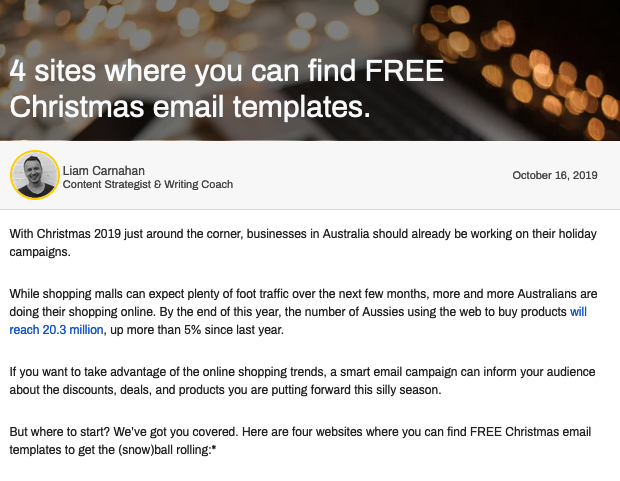With the holiday season just around the corner, it’s time to plan your seasonal keywords for Christmas, New Year and even the next burst of holiday activity at Easter.
Aussies love a good holiday sale, and we’re not just talking about the silly season. There are holidays throughout the year that give business owners the chance to offer deals and discounts and increase their revenue.
A few decades ago, all you had to do to take advantage of the holidays was put up a new window display, hang out a colourful sign and take out an ad in the local paper.
But times have changed. Nowadays, with so many businesses operating online, you need to implement a seasonal SEO strategy to bring visitors to your virtual doorstep. One of the best ways to do this is through the power of keywords – and if that word feels like a lump of coal in your stocking, don’t worry.
We’re going to explain the basics of what keywords are and how to best use them during any holiday. We’ve also done the hard work of finding keywords you can use now to start boosting your visibility.

Keywords: What are they and why do they matter?
You’ve read articles and heard people talk about the importance of keywords, but what really are they?
To boil it down to the simplest terms, keywords are the words and phrases people use to search the web (usually on Google). Search engines like Google use these words to deliver the right search results to the searcher.
If you have a website, you want to make sure the text on your site matches the searches people are using when they’re looking for information regarding your business. This will increase the likelihood of your website showing up on Google.
Since so many people use Google to find information, showing up on the first page for the right results can make a big impact on the traffic (and the quality of traffic) on your website.
How to use keywords effectively.
Simply placing the keywords you want to target on your website at random won’t do you much good, and could in fact harm your business.
Fortunately, there are a few simple rules you can follow when using these keywords to make sure they do what you want them to do:
Stick to one focus keyword per page, and use similar/related keywords throughout the page.
- Don’t over-stuff your copy with keywords – aim for one keyword every 200 – 300 words
- Put keywords in page titles and sub headers for extra visibility
- Don’t force keywords that sound awkward – you don’t want to sacrifice quality just to get in one extra keyword.
For example, take a look at how we used the keywords ‘Christmas email templates’ in this article. We’ve included the keyword in the headline, as well as within the post.

Finally, remember that SEO is a long-term strategy. It takes time for content and keywords you create to begin ranking. This means that implementing these keywords today won’t mean you’ll be on the first page of Google tomorrow, but the sooner you work them into your copy, the better the chance you’ll have of rising up the search engine ranks.
RELATED: SEO vs SEM: What’s the difference and do you need both?
How keyword research can help businesses of all kinds.
You might think that keyword research only applies to big businesses with big budgets. In fact, keywords are essential for all businesses because they help you find out what your potential customers are searching for and the content you need to create to answer their queries.
When it comes to the holidays, keyword research can help with identifying the holiday themes and topics your target audience is searching for. From there, you can create a content plan that’s targeted towards those themes and topics.
Not only that, but incorporating holiday-related keywords in your content also increases your ability to rank in search engine results for relevant queries. This helps deliver more traffic to your website and boosts your business’ visibility online.
Keyword ideas to get started.
You can research keywords and topics for your business completely free with tools like Ubersuggest and AnswerThePublic. Here are some example holiday themes to consider for different industries:
- Trades: Emergency tradies, 2023 design trends, planning a renovation
- Finance/accounting: New Year financial planning, holiday spending, creating a gift budget
- Health and fitness: Healthy Christmas lunch ideas, New Year’s fitness resolutions, holiday fitness plans
- Hair and beauty: Beauty trends for 2023, summer haircare, holiday beauty travel essentials
- Food and beverage: Holiday cocktail ideas, Christmas platter tips, where to eat out over the holidays.
Top holiday-related search terms in Australia.
To help get you started, we took a look at some of the best holiday-related keywords in Australia. All of these keywords have significant monthly search volume (meaning plenty of people are searching for them at the relevant time of year).
Our recommendation is to work these keywords into your site, either on a landing page dedicated to your holiday promotions, through a blog post, or on social media posts you make throughout the next six months.
| Keyword | Monthly search volume |
| black friday sales | 40,000 |
| chinese new year | 29,000 |
| personalised gifts | 18,000 |
| christmas gift ideas | 10,000 |
| mothers day gifts | 8,100 |
| easter holidays | 7,500 |
| black friday deals | 7,300 |
| holiday packages | 5,600 |
| holiday deals | 2,400 |
| cyber monday deals | 2,300 |
| last minute deals | 1,800 |
| cyber monday sales | 700 |
| valentines day gifts for him | 700 |
| easter sunday public holiday | 600 |
| easter sales | 500 |
| valentines day gifts for her | 500 |
| christmas sales | 450 |
| easter shopping hours | 300 |
| australia day sales | 250 |
| last minute holiday deals | 200 |
| holiday sales | 90 |
Looking for expert digital marketing advice? Get in touch with Yellow Pages today.
